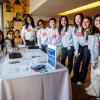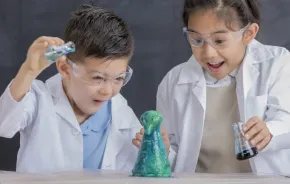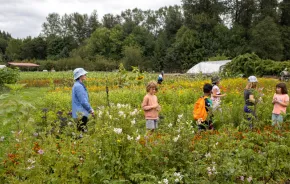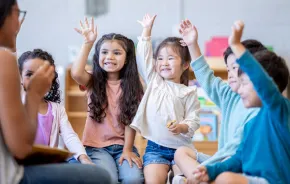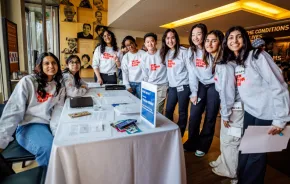
Editor's note: Introducing Idea Lab, in which we'll explore innovative education ideas and introduce you to the people who are dreaming them up.
As the parent of two pretty typical teenagers, I'm trying hard not to lose sleep over their futures. I’m sure most every parent in history has probably fretted about how their kids will turn out — whether they'll be happy in their lives, whether they'll be successful and have a positive impact on the world. These are age-old concerns, I know.
Sometimes I wonder if we're parenting at a time when those questions are even more acute, given the huge, blisteringly fast changes that are happening in the world and what feels like an increasing uncertainty of what their futures may hold. In short, I worry whether this whole generation of children is truly being prepared for what, by all indications, will be a decidedly different world from the one most of us were prepared to deal with. And if they’re not, I wonder what we do about that.
Few would argue any longer that the web is fundamentally changing just about every traditional institution that most of us grew up with. Our ability to use the devices we carry around in our pockets and backpacks to access information, to create and share new content and knowledge, and to connect with other people from all parts of the globe have radically changed journalism, media, business, politics and government, medicine and more. And we've only just started. We may not fully realize it, but when the history of these first couple of decades of the 21st century gets written, this period may well be labeled one of the most (if not the most) disruptive 20 years in human history.
What hasn't been fully disrupted yet, however, is the way we think about education and schools and the preparation of our children for the lives they will lead. While much has certainly changed in schools in their 150 years of existence, my kids' classroom experiences feel uncomfortably close to those I went through 35 years ago. Same subjects. Same type of homework. Same types of assessments. Same expectations. And, importantly, basically the same level of access to learning with the world outside the classroom walls. While there's certainly an element of comfort in that familiarity, at this point the last thing I want for my kids is the same education I had. Just as I wouldn't want their doctors to treat their ailments in the same way my doctors treated mine when I was their age, why would I want my children’s teachers to educate them in the same way my teachers taught me? Yet, by and large, that's what’s happening.
But understand this: The disruption is coming to schools, whether we parents like it or not. On balance, that's a good thing, though it's going to confuse the heck out of us. Our concepts of what an education looks like, what literacy is, how we assess the value of a college degree and the idea of work and employment will change very rapidly for our kids, and I think we'd be smart to push those changes forward, rather than be focused on preparing our children for a world that no longer exists.
Let's start with literacy. If we use the measuring stick provided by the National Council of Teachers of English, most of our kids (and most of us) are illiterate. Can your children "manage, analyze, and synthesize multiple streams of simultaneous information"? Can they "design and share information for global communities to meet a variety of purposes"? (You can see the whole list here.) What the NCTE understands is that because of the interconnected, linked, multimedia world in which we now live, it's not enough to simply be able to read and write. Oh, and by the way, the definition of literacy will continue to change, as our ability to use technology to create and connect evolves.
What about the traditional school curriculum? We have to understand that most of what currently accounts for the core courses and expected outcomes for our kids were framed in 1892 by a committee of 10 middle-aged academics who lived at a time when access to information and knowledge and people was pretty darn limited. If you wanted to get an education, you had to go to school to get it, and because of time and a need for efficiency, there was a limit to what to learn and how to learn it. But in the last 20 years, we've gone from a world of scarcity to a world of absolute abundance of information and teachers. I don't need to send my kids to school to learn algebra or French or Shakespeare. Sites like Khan Academy and Bozeman Science and thousands of others are proving highly successful in teaching kids those core subjects (and more) well enough to pass the traditional assessment. Even more powerfully, we can learn pretty much anything we have a want or a need to learn if we have access to the web and the skills to know how to use it well.
That disruption is also coming to higher education, and from a financial standpoint at least, that might be a very good thing. We’ve racked up over $1 trillion in student loan debt in this country, and because of serious changes in the workplace, many are wondering if the value of the college degree is worth that huge expense. Over 50 percent of last year’s college graduates are today either unemployed or underemployed, and another huge chunk are back in grad school racking up even more debt. Suddenly, the advent of Massively Open Online Courses (MOOCS) and a wide range of other free, yet valuable, learning opportunities have exploded on the scene. (See the Edupunks' Atlas, a sortable database of education resources, for example.) And now, organizations like the Mozilla Foundation and others are studying ways to award credit for the informal, self-directed, outside-the-institution learning that we and our children can do thanks to the web. In short, that very traditional definition of what it means to be “educated” is quickly shifting.
Which leads us, finally, to the disruption of the workforce. By some estimates, 65 percent of the jobs that kids entering grade school this year will do haven’t been invented yet. In fact, due to the web’s ability to connect us to specialists who can do the work we need done faster and more cheaply, the future holds fewer and fewer traditional “jobs” that will come with pensions and insurance and security. By the end of the decade, almost 50 percent of workers in the United States may be consultants or freelancers. Our kids may well spend more of their time competing for contracts than interviewing for full-time jobs. Are your children being prepared for that?
So, for all of that, I’m losing sleep some nights. I’m convinced that while my children need a sound foundation in math and science and reading and writing and the rest, what they need even more is to become masters of learning; connected adults who can take advantage of the amazing new opportunities for connecting and creating and doing work that matters with others from around the world. That they can “outlearn” their peers, find and solve real problems, and maintain a healthy sense of curiosity and creativity in their work. Unfortunately, that’s not what I’m seeing in their school experience right now. And to be honest, that’s not what I’m seeing in most schools around the world that I’ve had the opportunity to visit, whether public, private, parochial or other.
So welcome to this most interesting, disruptive moment in our history. As parents, this isn’t what we signed up for, nor what we expected. And we need to get our collective brains around these changes. To that end, I hope you’ll consider subscribing to the Raising Modern Learners newsletter. Every other week (or so), the newsletter arrives with six stories that capture the changes, challenges and opportunities our kids are facing.
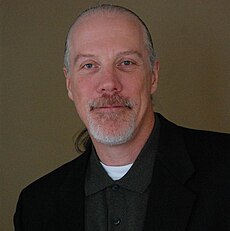 Will Richardson is a leading thinker and writer about the intersection of social online learning networks and education. He's an outspoken advocate for change in schools and classrooms in the context of the diverse new learning opportunities the web and other technologies have to offer. A veteran public school teacher, Richardson is the author of four books, including Why, School? How Education Must Change When Learning and Information Are Everywhere and the co-founder of Modern Learning Media.
Will Richardson is a leading thinker and writer about the intersection of social online learning networks and education. He's an outspoken advocate for change in schools and classrooms in the context of the diverse new learning opportunities the web and other technologies have to offer. A veteran public school teacher, Richardson is the author of four books, including Why, School? How Education Must Change When Learning and Information Are Everywhere and the co-founder of Modern Learning Media.





